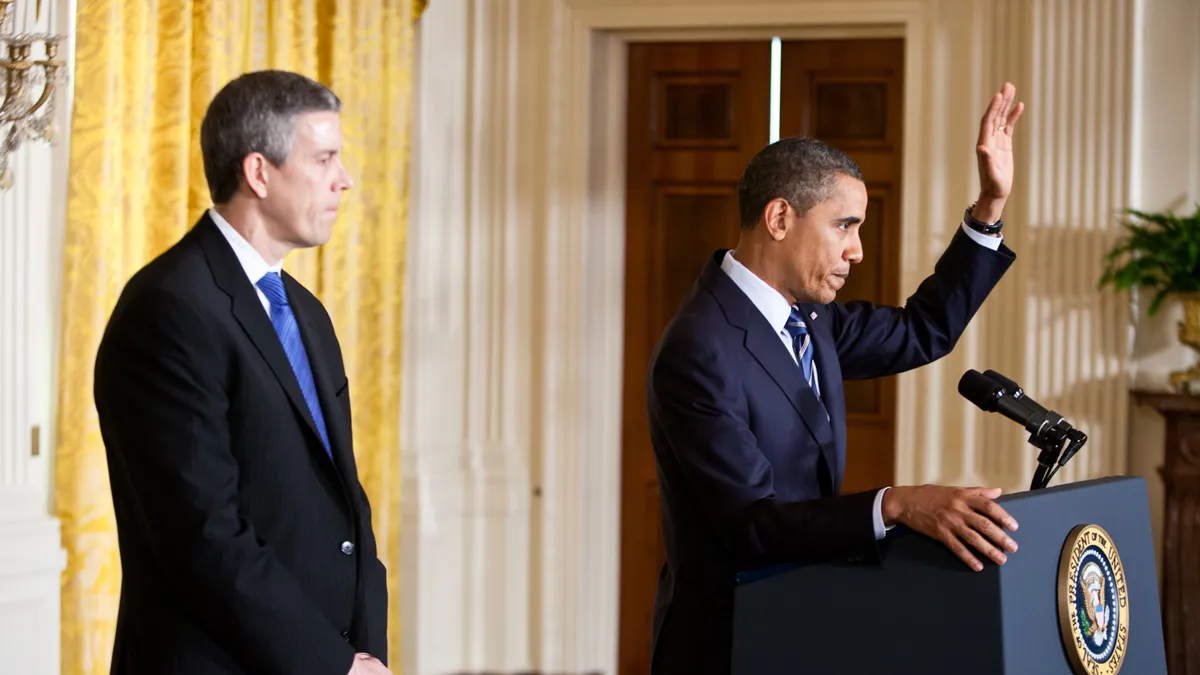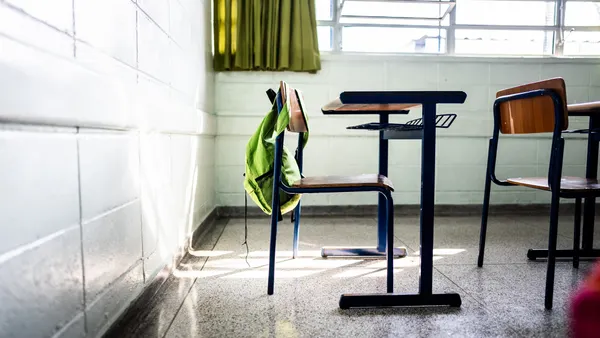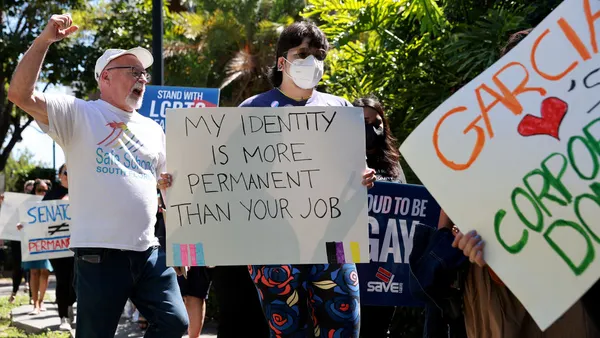Nearly two years after kicking off its review of Title IX, the Biden administration on April 22 released its much-anticipated final rule for the federal civil rights law prohibiting sex discrimination in schools. The new version is the third set of policies in just as many administrations.
The repeated overhaul has brought significant changes to school staff and operations, some of which overlapped with schools having to close down and divert resources as a result of the COVID-19 outbreak.
Title IX's complex history, however, dates back much further. Its future now also carries implications for transgender and LGBTQ rights, which increasingly have come under fire in recent months following the proliferation of so-called "Don't Say Gay" bills and other anti-LGBTQ state actions.
With the rule's implementation and challenges against it underway, we’ve updated our timeline of the major Title IX policy transformations over the past 13 years, since the Obama administration.
Over a decade of Title IX policy
-
April 2011
The U.S. Department of Education under former President Barack Obama issues a “Dear Colleague” letter outlining schools' obligation to protect students from sexual harassment and sexual violence under Title IX. It included prohibitions on gender-based harassment and, in some cases, hostility based on sex or sex-stereotyping. .
-
April 2014
The department issues a Q&A document following up on the 2011 Dear Colleague Letter, attempting to clarify the provisions of the 2011 guidance, including outlining responsibilities of a Title IX coordinator, when the department considers an institution to have known about an episode of sexual misconduct, procedural requirements, and employees’ duties to report sexual violence. It also explained that anyone can experience sexual violence, including "straight, gay, lesbian, bisexual and transgender students."
-
May 2016
The Education and Justice departments publish joint guidance detailing how Title IX protects transgender students. The agencies tell institutions they must use students’ pronouns that match their gender identity, even if other documents indicate a different sex. The guidance also states schools must allow transgender students to use locker rooms and other facilities that align with their gender identities, and tells schools they must protect transgender student records under the Family Educational Rights and Privacy Act.
-
February 2017
The Senate narrowly confirms Education Secretary Betsy DeVos, nominated by then-President Donald Trump. Later that month, the Education Department rescinds the 2016 guidance on transgender student protections under Title IX, a move that is met with unexpected pushback from DeVos.
-
September 2017
DeVos also withdraws the Obama administration’s 2011 guidance and the 2014 follow-up Q&A. The move garners sharp criticism from Democratic lawmakers and advocates for LGBTQ rights, and accolades from right-leaning activists.
-
November 2018
The Education Department under DeVos releases its draft rule on Title IX, which includes contentious provisions for higher education but less so for K-12. The department invites public comment on the draft regulation.
-
May 2020
Having reviewed more than 120,000 comments on the proposed rule, the department publishes the final iteration of the regulation which is a significant departure from districts' previous operations. It eliminates the need for live hearings in K-12 public schools settings, a measure met with praise from many education leaders.
It also triggers the Title IX process when any staff in the school is put on notice of sexual harassment or assault and requires the person investigating a Title IX case be separate from the person deciding its outcome. Both changes are met with ire from districts, which say the provisions are disconnected from public school environments. The rule largely preserves the draft DeVos had offered a year and a half prior, except for an added provision that would allow schools to “pass the trash” when an allegation of Title IX misconduct surfaces against an employee.
-
June 2020
Democratic attorneys general from 17 states and the District of Columbia file a lawsuit on claims the regulations are impractical, a month after their publication and ahead of their implementation date in August. Attorneys say K-12 schools will be required to “completely overhaul their systems” for sexual harassment complaints while COVID-19 has strained school resources, and that some stakeholders are not available in summe.
-
August 2020
DeVos’ rule takes effect despite growing pushback on the short implementation timeline and calls to delay the overhaul deadline.
Later the same month, the Office for Civil Rights updates a decision on a string of sex discrimination complaints, saying it serves as “a formal statement of OCR’s interpretation of Title IX” rooted in a 2020 Supreme Court ruling — Bostock v. Clayton County — that encompasses LGBTQ protections in federal employment law.
The OCR decision barred transgender students in Connecticut from sports teams that align with their gender identity and expression, which experts at the time said could be used to later bar transgender students from facilities.
-
January 2021
President Joe Biden takes office. Immediately, he issues an executive order stating everyone should receive equal treatment under federal law, regardless of sexual orientation or gender identity. His order cites Title IX.
-
March 2021
Biden signs an executive order that in part directs the Education Department to evaluate the Trump administration’s Title IX rule, which as a candidate he had pledged to undo.
-
June 2021
The Biden administration formally announces it will replace the DeVos rule with its own regulation. The same month, the Education Department said it interpreted Title IX to protect students based on their sexual orientation and gender identity.
-
December 2021
The Education Department announces it plans to release its proposed Title IX rule in April 2022, moving the date up from an initial publishing schedule of May. This displeases sexual assault prevention advocates, some of whom had called for a quicker timeline.
-
April 2022
The department says it will delay the draft Title IX rule, no longer releasing it in April. Separately, 26 mostly conservative organizations express concern in a letter that it is rewriting "historic regulation."
-
June 2022
The U.S. Department of Education releases its Title IX draft rule after much anticipation from the public and warnings from conservatives to walk back its process. The proposed rule offers protections for LGBTQ+ students and employees, as well as employees and students who are pregnant. Overall, the controversial proposal makes tweaks to K-12 and overhauls to higher education policy.
It receives around 240,000 comments from the public and kicks off nearly two years of federal review.
-
April 2024
After being delayed multiple times, the much-anticipated final Title IX rule is released by U.S. Department of Education under the Biden administration. For the first time, the regulations include protections for LGBTQ+ students and teachers, as well as for pregnant students and teachers.
It is immediately met with pushback from conservatives — who said they were preparing to legally challenge the rule shortly after its release — and with support from liberals.
-
August 2024
The Biden administration's U.S. Department of Education moves forward with the Aug. 1 implementation date for its Title IX rule, despite multiple temporary injunctions blocking its enforcement in at least 26 states. The rule goes into effect without a response from the U.S. Supreme Court on the administration's application to proceed with its enforcement of the uncontested portions of the rule.
Amid frustration and confusion from Title IX coordinators and lawyers, the U.S. Department of Education says on the morning of Aug. 1 it will implement the 2020 regulations in enjoined states.














